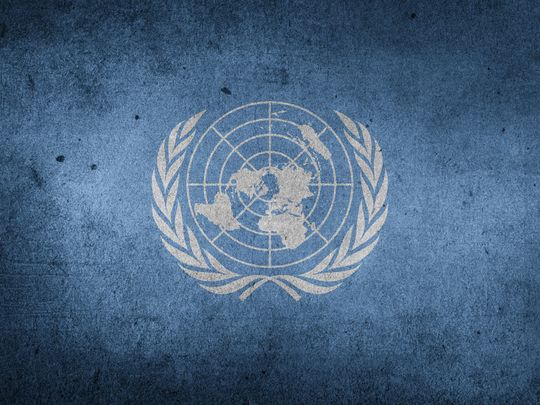On the day Russia attacked Ukraine, the UN Security Council convened in a televised 11-hour attempt to avert the conflict. For several minutes the session went on without a break without the delegates knowing that Russian tanks had already crossed the border. On millions of screens worldwide, we were able to follow the ineffectiveness of existing international institutions in real time.
Indeed, our planet faces problems – climate change, pandemics, and now the resurgent specter of nuclear war. Given the magnitude of these problems, UN reform cannot preclude unprecedented forms of cooperation between the United States and its main rivals, such as Russia and China. It is hard to imagine that a prominent American leader would dare even support such a proposal in today’s political climate.
But it’s important to remember that this used to be a mainstream argument in American politics. In the first half of the 20th century there was an extensive debate about world organization.
The main thrust of this debate was not unity or division between nation-states. It was about methods for cooperative action, such as whether cooperation could be successful without some kind of binding international rules or laws.
1907 Hamilton Holt, editor and editor of the liberal magazine The Independentlypresented the case clearly. Liberal reformers called for peace and disarmament worldwide.
The problem, Holt recognized, was that “disarmament cannot logically precede political organization, for until the world is politically organized there is no other way than by force of arms.” Shortly thereafter, in 1910, he instituted the Bartholdt Bennet resolution calling for an international federation. It was passed unanimously in both houses of the US Congress.
This perspective was vocally supported by journalist and intellectual Walter Lippmann, who declared in 1917 that the U.S. goal in entering World War I should be “nothing less than the federation of the world,” and by a host of other American intellectuals, including those of the pragmatic philosopher John Dewey and socialist intellectual Max Eastman.
A powerful international body
Similar calls preceded World War II, such as when Clarence Streit, a New York Times correspondent at the League of Nations, rallied a large electorate in support of an international federation ahead of another conflagration in Europe. His demands were echoed in 1943 by Republican presidential candidate Wendell Willkie, whose war book One World was one of the best-selling books in American history.
After Hiroshima, demands arose again. Roosevelt’s Secretary of War Henry L. Stimson argued just a month after the bombings that the United States must cooperate with the USSR on international nuclear control to prevent the bomb from being dropped on an anarchic world.
Even before the Soviet Union tested its first bomb in 1949, Albert Einstein, University of Chicago President Robert Hutchins, and many others argued that the dangers of nuclear war required world government, a demand later championed by the influential international relations scholar, Hans Morgenthau, was repeated British philosopher Bertrand Russell.
These efforts all failed. Before the First World War, the United States was not influential enough to persuade the powerful European states to give up their power-political system. On the eve of World War II, cooperation with rivals such as Nazi Germany or Imperial Japan was clearly impossible.
And in the late 1940s and early 1950s, cooperation with the only other major state left standing, the Soviet Union, was hampered by the irreconcilable ideologies of the two Cold War superpowers.
But there was another reason why the cause of international cooperation failed: there was no existential stake in continuing as before. States could survive wars even after defeats, as Germany’s rise in the 1930s showed.
It is better to risk the dangers of anarchic power politics than to cede authority to a powerful international body – precisely for this reason Joseph Stalin insisted on the Security Council’s veto at the United Nations.
The methods remain the same
The Soviet leader would take his chances of surviving the next world war rather than submitting to a global regime likely to be dominated by the United States. But now the Cold War is over.
Of course, it would be ridiculous to claim that sharp differences between the world’s great powers no longer exist. More importantly, we now face existential threats that simply did not exist before 1939.
If climate change is left unchecked, it portends catastrophic levels of global warming and the possibility of an uninhabitable planet. And, as the invasion of Ukraine vividly demonstrates, the major powers continue to possess thousands of nuclear weapons which, if used in a major war, would irreparably destroy nations and possibly wipe out humanity.
But while today’s dangers are greater, the methods of the world organization remain the same.
The United Nations, like the League of Nations, coexists with powerful nations in a world without binding international rules. In the interwar years, the League of Nations failed to prevent the collapse of the European order, and there was a growing consensus that the existence of a world organization in and of itself was not enough.
Unless the great nations of the world work together, avoiding catastrophe may be impossible, as early world federalists understood.
The United States, the most powerful nation in history, could focus all of its efforts on halting global warming or eliminating the possibility of nuclear war, and those efforts would come to nothing if its rivals did not follow suit.
The history of global reform in the US in the 20th century shows that prominent politicians and scholars saw serious international cooperation as a widely accepted, realistic approach to solving international problems. At a time of even greater peril, it is time to start thinking seriously again.
Tiziana Stella is a historian of US foreign policy, international organizations, and federalism. Campbell Craig is Professor of International Relations at Cardiff University.

